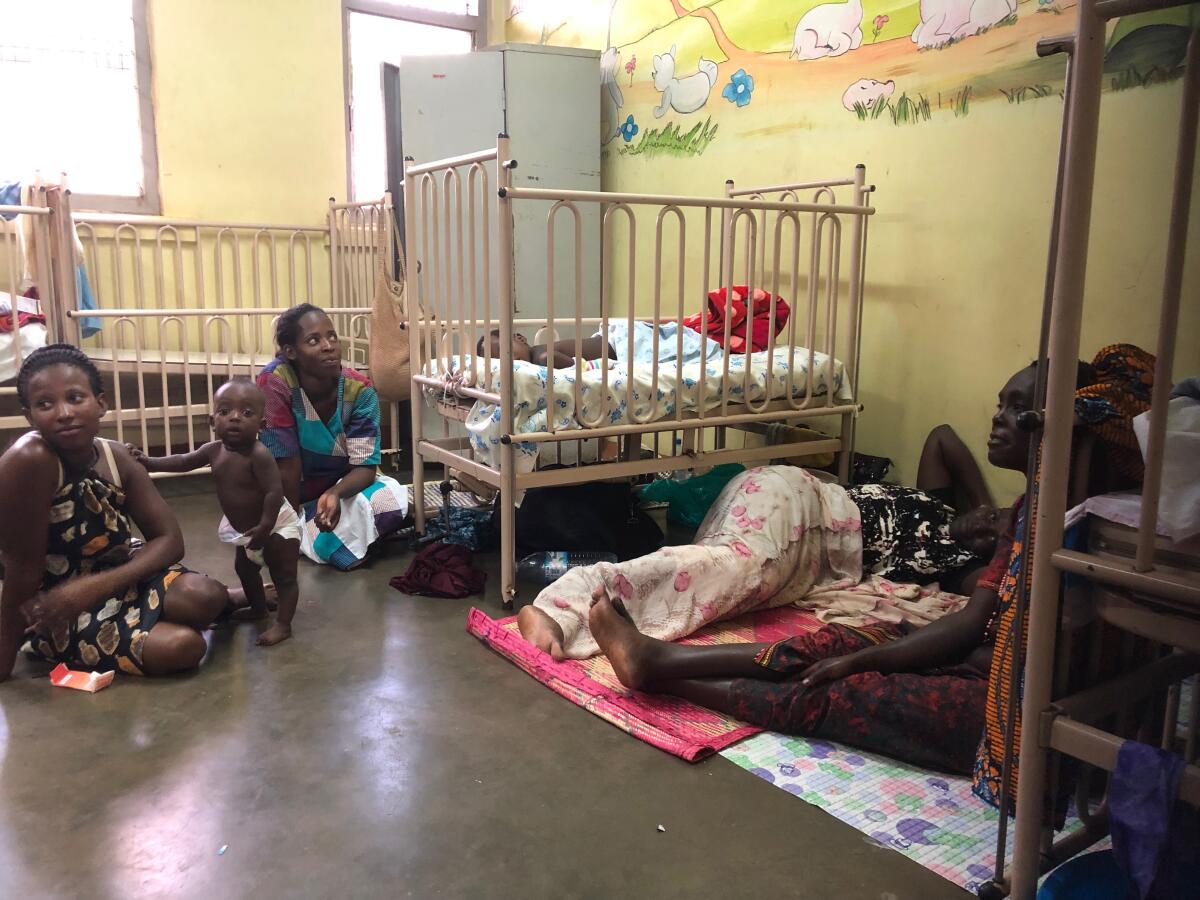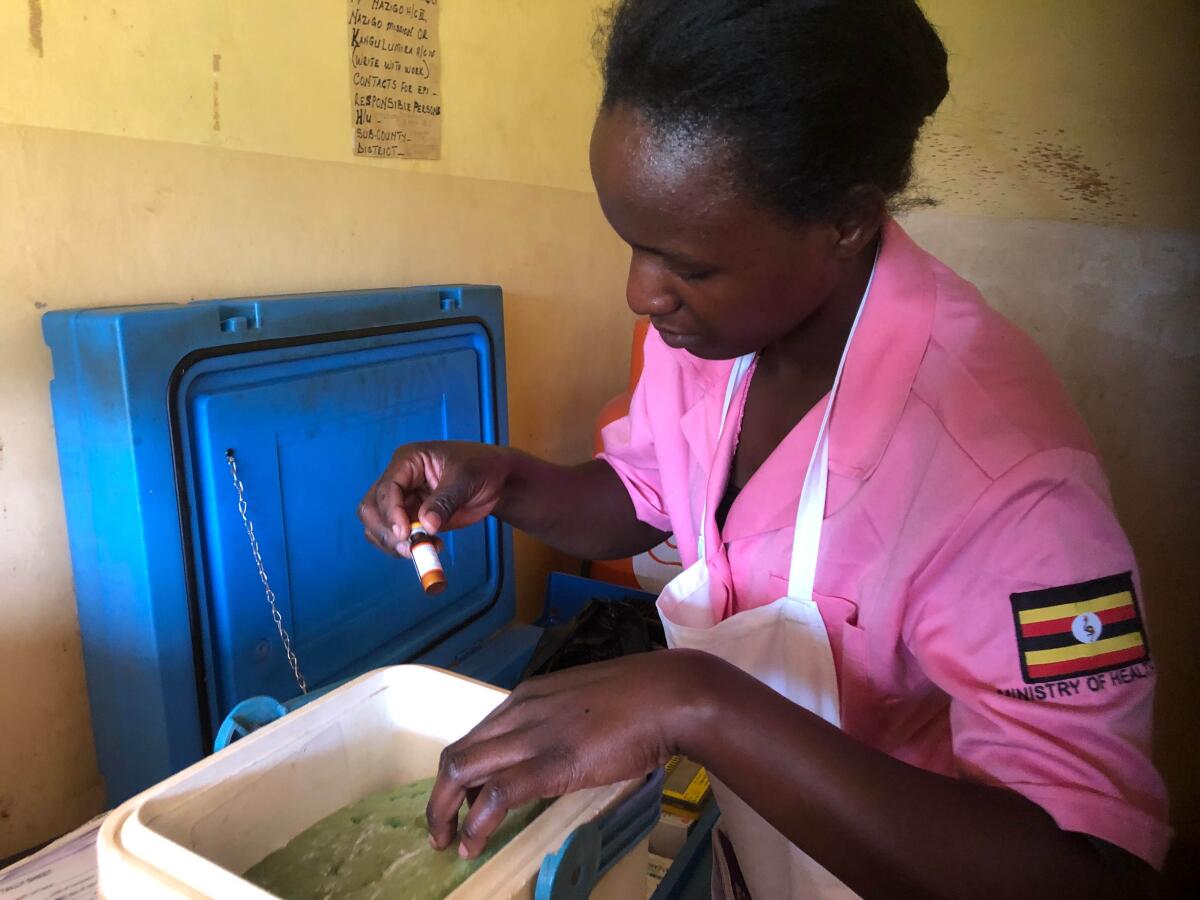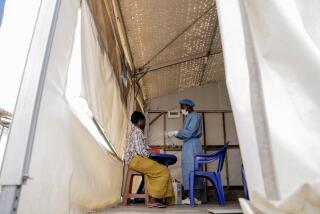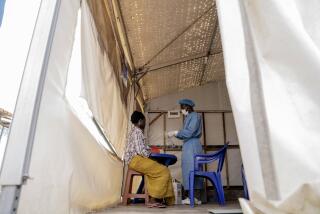Measles making a deadly comeback across Africa

KAMPALA, Uganda — Diana Nalubwama had noticed a lot of children in her neighborhood in Wakiso, a town on the outskirts of the capital, Kampala, had suddenly been coming down with measles, a disease that was rarely seen in Uganda in recent years.
But her 15-month-old daughter had been vaccinated, so she wasn’t expecting her to catch it, let alone end up severely ill and in an isolation ward in Mulago Hospital, Uganda’s largest public hospital.
“There are many, many people who don’t immunize,” Nalubwama, 28, said, sitting on the floor next to a metal crib while her daughter slept. “People [who refuse immunization] think the injections are given to weaken their children. I immunized my kids and I’m here, while those who didn’t are at home. It’s frustrating.”
Nalubwana isn’t the only one who is frustrated. Uganda has been grappling with an alarming spate of measles cases, even though there’s plenty of the vaccine to go around, health officials say. Even some children who received vaccinations, like her daughter, have been getting sick. Since January 2018, Uganda has confirmed more than 3,440 measles cases and nine measles-related deaths, according to the World Health Organization.
Measles is having a deadly resurgence across Africa, where, as of September, about 44% of this year’s cases worldwide have been recorded. That’s due in large part to a massive outbreak in the island nation of Madagascar off the coast of Mozambique, where more than 150,000 cases have been reported and more than 1,000 people have died due to low vaccination rates and a vaccine shortage once the outbreak took hold.
In Uganda, vaccination rates are higher, but thinly stretched health budgets, mistrust of vaccines and complacency among people who think measles is a disease of the past have helped lead to the outbreaks.
“For the last 15, 20 years, medical students had never even seen measles,” said Dr. Edison Arwanire Mworozi, a pediatrician at Mulago who sits on the government’s immunization steering committee. “[People] never thought it would come back. They thought, ‘If my child is healthy, why should I inject him?’”
Eight other African countries have also experienced outbreaks, many in places where health workers are in short supply and where keeping the vaccines cold and effective until they reach children in remote areas is extremely challenging.
The Democratic Republic of Congo, while dealing with Ebola and ongoing armed conflict, has also been grappling with its deadliest measles outbreak in seven years, with more than 2,700 deaths reported since January, according to Doctors Without Borders, which is helping vaccinate children in the country.
Worldwide, by the end of the 20th century, measles was supposed to have been on its way out. A vaccine for the highly contagious viral disease, which used to kill more than 2 million people a year, was developed in 1963. As routine immunizations of children ramped up, the virus stopped circulating in many countries.
Between 2000 and 2017, global measles deaths plummeted by 80%. With a cheap and effective vaccine, many experts thought that measles, like smallpox, was a good contender for global eradication.
That optimism is fading. The U.S., for its part, has had its worst measles outbreak since 1992 thus far this year, with 1,250 recorded cases spread out across 31 states, according to the Centers for Disease Control and Prevention.
Most were part of a long-running outbreak in New York that has just been declared over, and the U.S. narrowly escaped losing its WHO measles elimination status in early October. The United Kingdom and three other countries in Europe lost that status this year.
When Uganda’s measles outbreak started in 2017, it caught health officials off guard. For the 10 previous years, about 80% of children in Uganda received the vaccine, a higher rate than in several countries in the region although not enough to achieve “herd immunity,” which occurs when around 95% of the population is vaccinated and the population is deemed protected from the spread of the disease.
Even so, for many years, large outbreaks were rare.
But suddenly, after the outbreak started two years ago, the isolation ward at Mulago was packed with parents like Nalubwama and their sick youngsters, prompting doctors and health officials to wonder what had gone wrong. Had the disease become more virulent? Was there a new strain of the virus? Was there a break in the “cold chain” for keeping the medicine effective as it was moved from warehouses to health centers?
Most people build up resistance to the measles virus after one vaccine dose; after two doses, the vaccine is nearly 100% effective. Uganda’s routine immunization program only covers the first vaccination; to fill the gaps, the government holds regular mass immunization campaigns so children can get the booster or a first dose if they haven’t already.
Part of the reason for Uganda’s outbreak may have been that the government delayed a mass immunization campaign that had been planned for 2018, experts say.
Whatever happened, the bottom line is that not enough people are getting vaccinated, said Mworozi, leaving the entire country vulnerable.
In the small rural clinics where many people are to be immunized, unreliable medical supplies, inadequate staffing and hostile communities are also factors.

At Bukamba Health Center, a government clinic in the Kayunga district of central Uganda, health worker Sharita Ndagire pulls vials of the measles vaccine out of a gas-powered refrigerator and packs them into a small white cooler.
When the clinic doesn’t get its government gas supply on time, health workers have to run the vaccines to the refrigerator at another clinic so they remain effective.
Ndagire will take her cooler to a nearby village, and try to persuade parents to have their children immunized.
“We’re just trying to reach the stubborn ones,” Ndagire said, smiling.
Immunization coverage in this area is only 63%, according to district health officials. Last year, there was a relatively small local measles outbreak. The Bukamba clinic alone saw about 19 measles cases in a little over two weeks beginning in late April, mostly in children under 3.
“We heard children were dying, but people weren’t bringing them in,” recalled Dorothy Nampijja, the head of the clinic.
Nampijja and her staff recorded one death; people living in Katikanonyi, the village where the outbreak began, said there were multiple fatalities.
On a late June afternoon in Katikanonyi, a group of parents gathered in front of the village mosque to hear what health officials and representatives of UNICEF, which locates and purchases vaccines for the government, had to say.
“There was a rumor going around that the drugs were contaminated,” said Mutondo Twaibu, a primary school teacher.
He said some parents thought the vaccines might paralyze their children, or make them sterile. “We were hiding the children when it was time to vaccinate them.”
Twaibu and others said they have since accepted vaccinations, but health officials in the district are still battling this kind of misconception.
“Some people think that injections do more harm than good,” said Kayunga district health officer Matovu Ahmed. “As more people have access to education, these beliefs fade.”
Ugandan government spokesman Ofwono Opondo blamed the resurgence of measles on the large number of refugees from neighboring countries, and said that among Ugandans, the vaccination program “is quite well spread and quite well accepted.”
He said any incidents of communities preventing their children from being vaccinated have been “quickly dealt with.”
This month, the government is scheduled to hold its long-delayed countrywide mass immunization campaign over four days.
While officials hope that will help stamp out the ongoing outbreaks, some in Katikanonyi worry the disease could come back again. Even after last year’s scare, not everyone in the village is taking their kids in.
“We try to work as a team,” said Aisha Serugo, a 20-year-old mother of two. “If I’m taking my child [to get a vaccine], I remind my neighbors. But not everyone does it. So other kids get sick.”
Mahr is a special correspondent.
More to Read
Sign up for Essential California
The most important California stories and recommendations in your inbox every morning.
You may occasionally receive promotional content from the Los Angeles Times.










